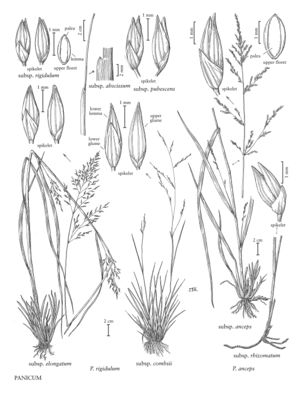familyPoaceae
subfamilyPoaceae subfam. Panicoideae
genusPanicum
subgenusPanicum subg. Agrostoidea
sectionPanicum sect. Agrostoidea
speciesPanicum rigidulum
subspeciesPanicum rigidulum subsp. combsii
Difference between revisions of "Panicum rigidulum subsp. combsii"
Synonyms: Panicum longifolium var. combsii Panicum combsii
Treatment appears in FNA Volume 25. Treatment on page 477.
FNA>Volume Importer |
FNA>Volume Importer |
||
| Line 6: | Line 6: | ||
|synonyms={{Treatment/ID/Synonym | |synonyms={{Treatment/ID/Synonym | ||
|name=Panicum longifolium var. combsii | |name=Panicum longifolium var. combsii | ||
| − | |authority= | + | |authority= |
| + | |rank=variety | ||
}} {{Treatment/ID/Synonym | }} {{Treatment/ID/Synonym | ||
|name=Panicum combsii | |name=Panicum combsii | ||
| − | |authority= | + | |authority= |
| + | |rank=species | ||
}} | }} | ||
|hierarchy=Poaceae;Poaceae subfam. Panicoideae;Poaceae tribe Paniceae;Panicum;Panicum subg. Agrostoidea;Panicum sect. Agrostoidea;Panicum rigidulum;Panicum rigidulum subsp. combsii | |hierarchy=Poaceae;Poaceae subfam. Panicoideae;Poaceae tribe Paniceae;Panicum;Panicum subg. Agrostoidea;Panicum sect. Agrostoidea;Panicum rigidulum;Panicum rigidulum subsp. combsii | ||
| Line 18: | Line 20: | ||
}}<!-- | }}<!-- | ||
| − | --><span class="statement" id="st-undefined" data-properties=""><b>Plants </b>similar to subsp. pubescens, but often shortly rhizomatous, more nearly glabrous, and more deeply and consistently purple throughout. <b>Ligules</b> nearly obsolete; blades usually 2-7 mm wide, often folded or involute, usually pilose adaxially, at least near the base, bases about equal in width to the subtending sheaths. <b>Spikelets</b> 2.6-3.8 mm, usually purple, slender, erect on the pedicels. <b>Lower</b> glumes to 3/4 as long as the spikelets.</span><!-- | + | --><span class="statement" id="st-undefined" data-properties=""><b>Plants </b>similar to <i></i>subsp.<i> pubescens</i>, but often shortly rhizomatous, more nearly glabrous, and more deeply and consistently purple throughout. <b>Ligules</b> nearly obsolete; blades usually 2-7 mm wide, often folded or involute, usually pilose adaxially, at least near the base, bases about equal in width to the subtending sheaths. <b>Spikelets</b> 2.6-3.8 mm, usually purple, slender, erect on the pedicels. <b>Lower</b> glumes to 3/4 as long as the spikelets.</span><!-- |
-->{{Treatment/Body | -->{{Treatment/Body | ||
| − | |discussion=<p>Panicum rigidulum subsp. combsii is restricted to the United States, where it grows in the same moist habitats as subsp. pubescens, but is much less common. Its long, narrow, purple, often gaping spikelets somewhat resem¬ble those of P. virgatum, which often grows in the same habitats.</p> | + | |discussion=<p><i>Panicum rigidulum </i>subsp.<i> combsii</i> is restricted to the United States, where it grows in the same moist habitats as <i></i>subsp.<i> pubescens</i>, but is much less common. Its long, narrow, purple, often gaping spikelets somewhat resem¬ble those of <i>P. virgatum</i>, which often grows in the same habitats.</p> |
|tables= | |tables= | ||
|references= | |references= | ||
| Line 30: | Line 32: | ||
-->{{#Taxon: | -->{{#Taxon: | ||
name=Panicum rigidulum subsp. combsii | name=Panicum rigidulum subsp. combsii | ||
| − | |||
|authority=(Scribn. & C.R. Ball) Freckmann & Lelong | |authority=(Scribn. & C.R. Ball) Freckmann & Lelong | ||
|rank=subspecies | |rank=subspecies | ||
| Line 37: | Line 38: | ||
|basionyms= | |basionyms= | ||
|family=Poaceae | |family=Poaceae | ||
| − | |illustrator=Linda A. Vorobik | + | |illustrator=Linda A. Vorobik;Cindy Roché |
| + | |illustration copyright=Utah State University | ||
|reference=None | |reference=None | ||
|publication title= | |publication title= | ||
|publication year= | |publication year= | ||
|special status= | |special status= | ||
| − | |source xml=https:// | + | |source xml=https://jpend@bitbucket.org/aafc-mbb/fna-data-curation.git/src/f50eec43f223ca0e34566be0b046453a0960e173/coarse_grained_fna_xml/V25/V25_1273.xml |
|subfamily=Poaceae subfam. Panicoideae | |subfamily=Poaceae subfam. Panicoideae | ||
|tribe=Poaceae tribe Paniceae | |tribe=Poaceae tribe Paniceae | ||
Revision as of 20:32, 16 December 2019
Plants similar to subsp. pubescens, but often shortly rhizomatous, more nearly glabrous, and more deeply and consistently purple throughout. Ligules nearly obsolete; blades usually 2-7 mm wide, often folded or involute, usually pilose adaxially, at least near the base, bases about equal in width to the subtending sheaths. Spikelets 2.6-3.8 mm, usually purple, slender, erect on the pedicels. Lower glumes to 3/4 as long as the spikelets.
Discussion
Panicum rigidulum subsp. combsii is restricted to the United States, where it grows in the same moist habitats as subsp. pubescens, but is much less common. Its long, narrow, purple, often gaping spikelets somewhat resem¬ble those of P. virgatum, which often grows in the same habitats.
Selected References
None.
Lower Taxa
None.
... more about "Panicum rigidulum subsp. combsii"
Conn. +, N.J. +, N.Y. +, W.Va. +, Del. +, D.C. +, Wis. +, B.C. +, N.S. +, Ont. +, Mass. +, Maine +, N.H. +, R.I. +, Vt. +, Fla. +, Ala. +, Kans. +, Ky. +, La. +, Mo. +, Okla. +, Pa. +, Tenn. +, Tex. +, Va. +, Puerto Rico +, N.C. +, S.C. +, Md. +, Calif. +, Miss. +, Ark. +, Ill. +, Ga. +, Ind. +, Mich. +, Ohio + and Oreg. +
Present +
Panicum rigidulum subsp. combsii +
Panicum rigidulum +
subspecies +
